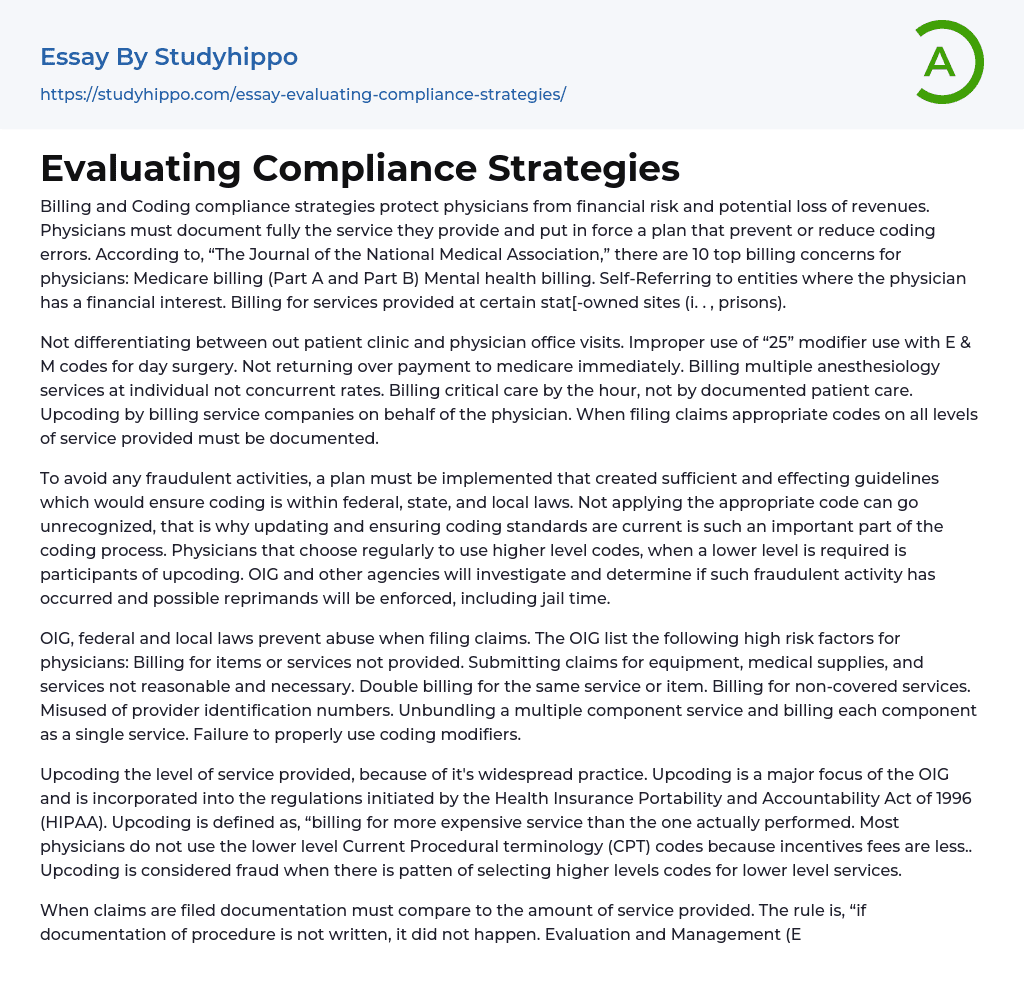
Establishing strategies for compliant billing and coding can protect doctors from possible financial risks and loss of income. It is imperative for physicians to accurately record the services they provide, and develop a system that limits or prevents errors in coding. As stated by "The Journal of the National Medical Association", among the ten most significant issues related to doctor's billing are: Medicare part A & B Billing, invoicing for mental health services, self-referral to entities where a physician has financial interests, as well as charging for services performed at certain state-run institutions like prisons.
Failing to distinguish between outpatient clinic and doctor's office visits. Incorrect application of the "25" modifier with E & M codes for day surgery. Delaying the immediate reimbursement of overpaid amounts to Medicare. Charging individual rates for multiple anest
...hesiology services instead of concurrent rates. Billing for critical care on an hourly basis, rather than based on documented patient care. Service companies upcoding on behalf of physicians. It is essential to document appropriate codes for every level of service provided when submitting claims.
In order to prevent potential illicit actions, a comprehensive and effective strategy that includes robust regulations is required. These guidelines must ensure compliance with federal, state, and local laws in terms of coding practices. Often the improper use of codes can go unnoticed; hence continuous review and affirmation of current coding standards becomes a crucial part of the procedure. Physicians who consistently prefer higher level codes over lower ones when it's not justified are viewed as engaging in upcoding. Organizations like OIG bear the responsibility to probe into any unlawful activities conducted, where punishment
could vary from monetary fines to incarceration.
The Inspector General's Office (OIG), in conjunction with federal and local regulations, is established to curb fraudulent acts in claim submissions. The OIG has pinpointed several risk factors for doctors such as: invoicing for items or services not provided; filing claims for non-critical medical supplies, services, or equipment; double billing for identical items or services; billing uninsured services; misuse of medical provider identification numbers; separation of a multi-part service into individual parts each charged as an independent service; and the wrong use of coding modifiers.
The practice of enhancing the quality of service in regular applications, often known as Upcoding, has been prominently recognized by the OIG and is included in the rules set forth by the Health Insurance Portability and Accountability Act of 1996 (HIPAA). Upcoding is defined as "billing for a more expensive service than what was actually provided." Many physicians refrain from using lower-rated Current Procedural Terminology (CPT) codes due to reduced incentive payments. If a continuous pattern of choosing higher-grade codes for lesser services emerges, it's considered as Upcoding fraud.
Claims filings require documentation to align with the services rendered. The prevailing principle states, "if a procedure's documentation is not recorded, it's as if the procedure never happened." The Evaluation and Management (E ; M) guidelines are regularly reviewed to ensure that Medicare and other payers abide by them. The E ; M are responsible for informing and updating rules and regulations for coding to ensure a sustained adherence to the compliance. Physicians carry the onus of making sure their staff are proficient in coding standards and should intermittently verify records
themselves to ensure adherence to all guidelines.
Physicians are continuously updated to ensure that the medical practice adheres to all requisite rules and standards. If the modifiers do not match with the provided services, insurance claims may be rejected. All responsibilities of a medical practice lie solely on its doctor; hence, any erroneous claims pose threats to the practice. It is vital for coding stability and consistency to provide patients with high-quality service free from errors and allow physicians accurate and efficient billing.
- Interview essays
- Job Interview essays
- Career Choice essays
- Career Goals essays
- Portfolio essays
- Community Service essays
- Work-Life Balance essays
- Performance Appraisal essays
- Job essays
- Employee essays
- Skills essays
- Service essays
- Vocation essays
- Internship essays
- Work Experience essays
- Duty essays
- Dream Job essays
- Career Plan essays
- Business Law essays
- Contract essays
- Consumer Protection essays
- Property essays
- Ownership essays
- Agreement essays
- Common Law essays
- Contract Law essays
- Justice essays
- Security essays
- Tort Law essays
- United States Constitution essays
- Crime essays
- Lawsuit essays
- Treaty essays
- Family Law essays
- Marijuana Legalization essays
- Constitution essays
- War on Drugs essays
- Court essays
- Jury essays
- Police essays
- Protection essays
- Community Policing essays
- Criminal Law essays
- Judge essays
- Lawyer essays
- Employment Law essays
- Copyright Infringement essays
- Injustice essays
- Intellectual Property essays
- Breach Of Contract essays



